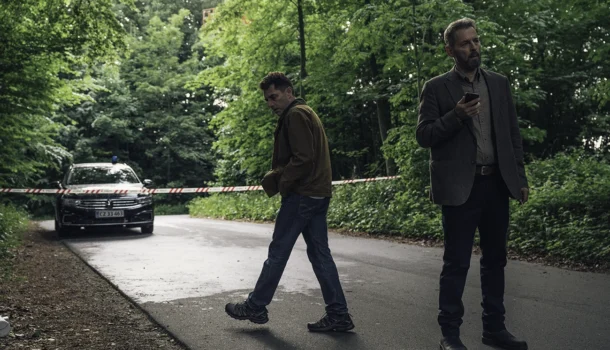Some films go beyond storytelling — they operate as instruments for dissecting human relationships, probing the blind spots of bonds held together less by affection than by a silent pact of appearances. The Danish feature directed by Barbara Rothenborg ventures into this unstable terrain by exposing the erosion of a marriage that should have dissolved with time but instead persists as a reliquary of vanity and mutual resentment. Cleverly scripted by Anders Rønnow Klarlund and Jacob Weinreich, the narrative examines the intimate life of a couple who, beneath a veneer of stability, have turned pretense into a survival tactic. In their world, truth isn’t a goal — it’s a nuisance to be evaded, and when it finally breaks through, it detonates everything around it like aged gunpowder.
What initially appears to be a domestic tale of infidelity gradually reveals itself as a meticulous exercise in emotional anatomy. Leonora and Christian live in a flawlessly designed house — a projection of status and the illusion of control — on the edge of a lake surrounded by dense woods, as if the setting itself were in on the performance. Their son, Johan, recently recovered from a serious illness, serves as the final visible thread binding them together. Yet it is beneath this seemingly harmonious routine that dissonant elements begin to fester: the lover, the ongoing betrayal, the corrosive jealousy, and most of all, a latent pull toward imbalance. When a business celebration becomes the trigger for collapse, the mask of normalcy can no longer withstand the weight of what it conceals.
The figure of the lover, played with precision by Sus Wilkins, escapes the usual stereotypes and takes on disquieting dimensions. She’s not the homewrecker trope; rather, she becomes the mirror that reveals the household — as a symbolic construct — was already rotting from within. Her presence disturbs not as an outsider, but as the reflection of a disintegration Leonora refuses to confront. At this point, the film draws closer to the tragic tradition of 19th-century novels, where social convention suffocates individual desire and drags everyone toward the abyss. The parallel with “Anna Karenina” is no accident: like Tolstoy, Rothenborg understands that love, when hostage to external expectations and unspoken contracts, is less a promise of fulfillment than a force of ruin.
The resonance with “The Sorrows of Young Werther” deepens this reading. If Goethe gave lyrical and introspective form to the agony of romantic renunciation, Rothenborg inverts the movement, constructing a protagonist whose refusal to accept loss spirals into increasingly erratic behavior. What’s at stake isn’t merely a broken marriage, but the impossibility of relinquishing what once gave meaning to one’s identity. Leonora doesn’t just want her husband back — she wants to reclaim the story in which she was still the central character, not a supporting figure in a narrative steered by forces beyond her grasp. The music she abandoned, the promising career she gave up — everything converges into a void now filled by actions with irreversible consequences.
Together with Klarlund and Weinreich, Rothenborg crafts a sinister mirroring between character psychology and narrative structure. The logic of suspense — with its diversions, its slow reveals — is applied not only to the plot, but to the emotional dynamics themselves. Every seemingly mundane gesture — a glance, a hesitant remark, a toast — carries within it the seed of collapse. The director understands that the most unsettling horror doesn’t come from outside but from what gradually settles within us and, once noticed, has already taken root. In this case, clarity is not redemption — it’s just another layer of torment.
In the third act, as the film embraces farcical elements more overtly, what might seem like a tonal misstep reveals itself as a calculated act of narrative destabilization. The pastiche of psychological thrillers in the style of Adrian Lyne or Brian De Palma functions here as a metacommentary: the delirium is not just within the characters, but embedded in the film’s very form, which adopts excess as its route to truth. There’s a self-aware theatricality that amplifies the tension and makes any return to initial restraint impossible. Everything becomes exaggerated — because everything that was once repressed can no longer be contained.
By the end, the film offers fewer answers than questions — and that’s precisely its triumph. There are no clear culprits, no comfortably innocent parties. What remains is an emotional battleground where each person struggles to preserve some shred of dignity or control. “Loving Adults” doesn’t deliver verdicts, but disturbances: What is fidelity when appearances matter more than truth? What’s left of love when the relationship is held together only by fear of confrontation? These are the questions — disquieting, inconvenient, impossible to ignore — that continue to echo long after the final scene fades to black.
Film: Loving Adults
Director: Barbara Rothenborg
Year: 2022
Genres: Crime/Drama/Thriller
Rating: 9/10

